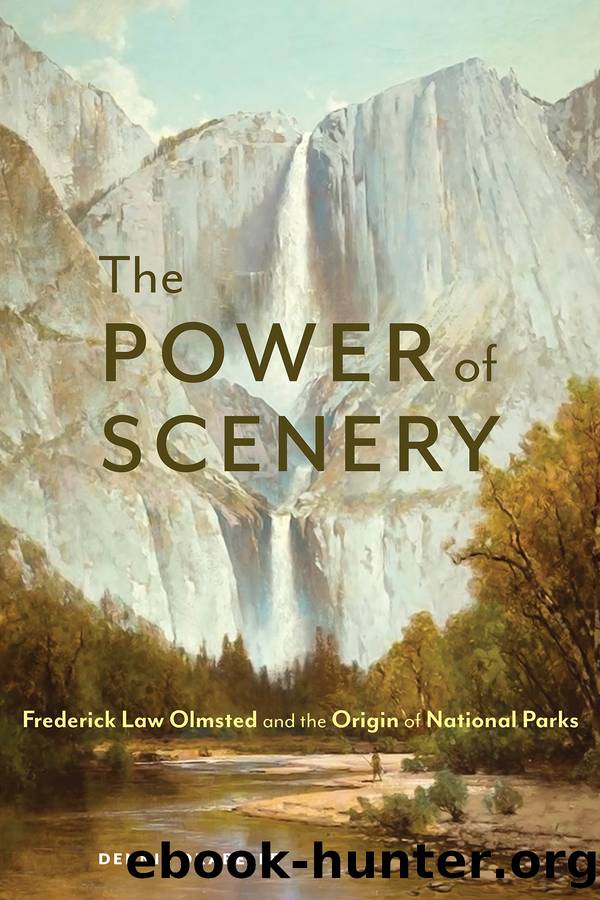The Power of Scenery: Frederick Law Olmsted and the Origin of National Parks by Dennis Drabelle

Author:Dennis Drabelle [Drabelle, Dennis]
Language: eng
Format: epub
Tags: HIS036040 History / United States / 19th Century, nature, Social Science, Environmental Conservation & Protection, General, NAT011000 Nature / Environmental Conservation & Protection, 19th Century, history, United States
ISBN: 9781496220776
Google: 0TBAEAAAQBAJ
Publisher: U of Nebraska Press
Published: 2021-11-15T23:49:44.719813+00:00
De Lacy ended the paragraph by identifying the area as âwhat was afterward called the âLower Geyser Basinâ of the Madison, by Prof. Hayden.â7
In the winter of 1864â65 a Jesuit priest, Francis Xavier Kuppens, was posted to a mission on the Missouri River. On hearing of Yellowstoneâs marvels, Father Kuppens got some Piegan Indians to take him there. Three decades afterward Kuppens recalled seeing âthe Grand Cañon, hot and cold geysers, variegated layers of rock, the Fire Hole, etc.â In the spring of 1865, he added, the acting territorial governor, Thomas Meagher, and several other reconnoitering Montanans got caught in a snowstorm. Taking shelter in his mission, they were enthralled by the priestâs account of his recent visit to thermal Yellowstone. âNone of the visitors had ever heard of the wonderful place,â Kuppens noted. âGen. Meagher said if things were as described the government ought to reserve the [Yellowstone] territory for a national park. All the visitors agreed that efforts should be made to explore the region and that a report of it should be sent to the government.â8
Although this vignette suggests that the national park idea had been making headway with wide-awake Americans, itâs possible that in 1897, when Kuppens penned his account, his recollection was colored by intervening events. Traveling with Meagher had been a lawyer named Cornelius Hedges, later the central figure in the famous campfire tale of Yellowstone parkâs origin. Weâll take a close look at that episode later in this chapter, but for now suffice it to say that Kuppens may have unwittingly read Yellowstoneâs subsequent history back into the remarks of the men he hosted in 1865.
An 1866 investigation of Yellowstone by a small group led by one George Huston is noteworthy for the favorable comparison it elicited from the editor of the Montana Post. Hustonâs description of Yellowstone, the editor wrote, put the regionâs scenery in the same league with Yosemiteâs, as recently touted by Samuel Bowles in his book Across the Continent.
Three years later the Helena Herald ran an item about a Yellowstone expedition being put together by men who counted in Montana. The news came to the attention of Charles W. Cook, originally from Maine, now running a company that supplied water to placer mines. Cook made up his mind to take part in the venture. On failing to secure a military escort through Indian country, the Montana mandarins canceled the trip, but Cook was undeterred. âShorn of the prestige attached to the names of a score of the brightest luminaries in the social firmament of Montana,â he self-deprecatingly wrote in his diary, â[the expedition] has assumed proportions of utter insignificance, and [is] of no importance to anybody in the world except the three actors themselves.â9 The âthree actorsâ were David E. Folsom, after whom the expedition was named; William Peterson; and Cook himself. They more or less dared themselves into making the trip.
After the factâindeed, half a century after the factâCook held a more exalted opinion of the expeditionâs importance.
Download
This site does not store any files on its server. We only index and link to content provided by other sites. Please contact the content providers to delete copyright contents if any and email us, we'll remove relevant links or contents immediately.
| Africa | Americas |
| Arctic & Antarctica | Asia |
| Australia & Oceania | Europe |
| Middle East | Russia |
| United States | World |
| Ancient Civilizations | Military |
| Historical Study & Educational Resources |
Machine Learning at Scale with H2O by Gregory Keys | David Whiting(4296)
Never by Ken Follett(3937)
Fairy Tale by Stephen King(3370)
Oathbringer (The Stormlight Archive, Book 3) by Brandon Sanderson(3161)
The Man Who Died Twice by Richard Osman(3072)
Will by Will Smith(2911)
Rationality by Steven Pinker(2352)
Can't Hurt Me: Master Your Mind and Defy the Odds - Clean Edition by David Goggins(2324)
The Dark Hours by Michael Connelly(2300)
Friends, Lovers, and the Big Terrible Thing by Matthew Perry(2219)
The Dawn of Everything: A New History of Humanity by David Graeber & David Wengrow(2197)
Principles for Dealing With the Changing World Order: Why Nations Succeed and Fail by Ray Dalio(2043)
A Short History of War by Jeremy Black(1843)
HBR's 10 Must Reads 2022 by Harvard Business Review(1840)
Go Tell the Bees That I Am Gone by Diana Gabaldon(1754)
A Game of Thrones (The Illustrated Edition) by George R. R. Martin(1725)
Kingdom of Ash by Maas Sarah J(1668)
515945210 by Unknown(1662)
443319537 by Unknown(1546)
